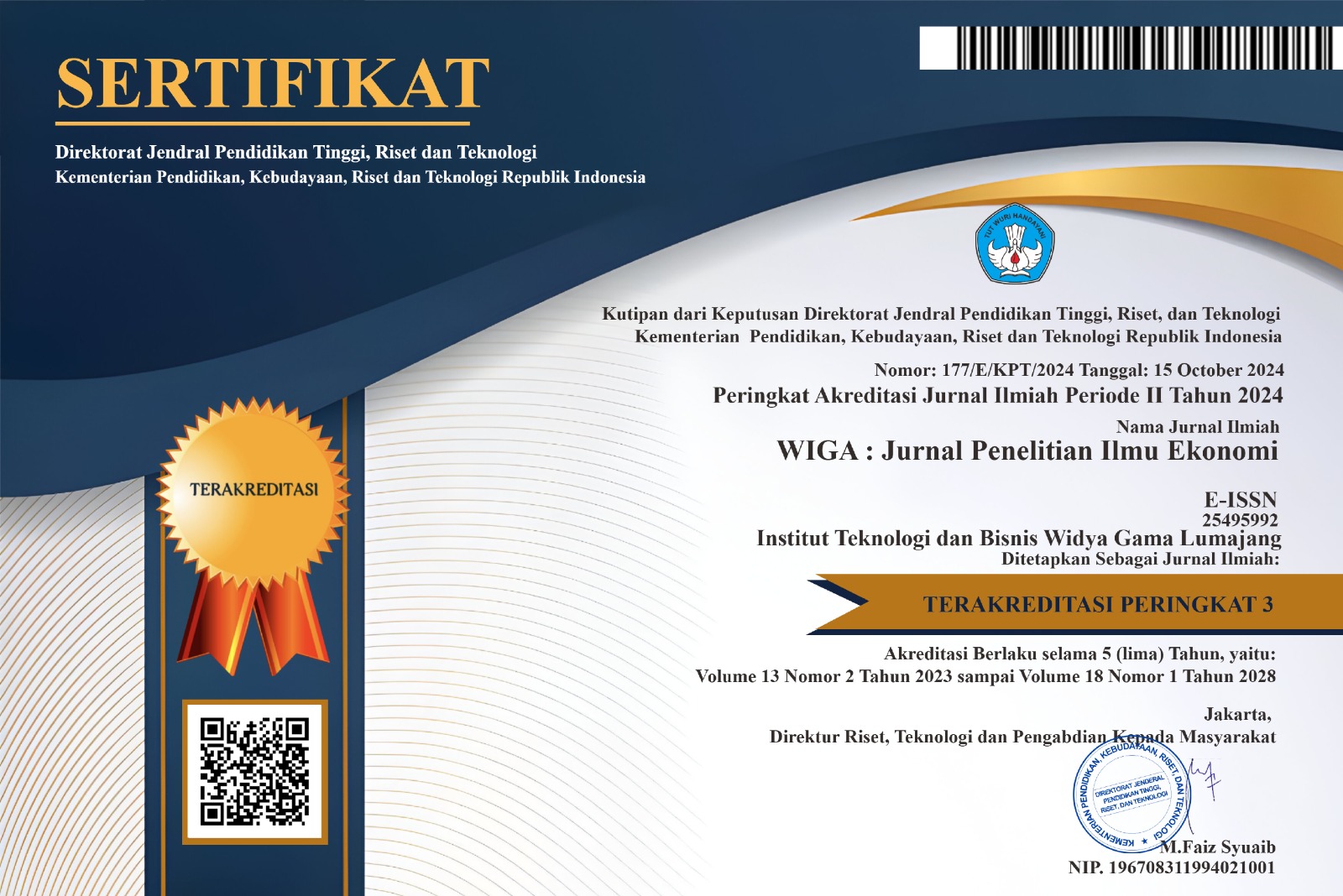Isu Konseptual Tentang Perasaan Berkewajiban (Felt Obligation) Individu Dalam Perspektif Kerangka Pertukaran Sosial
DOI:
https://doi.org/10.30741/wiga.v8i1.231Keywords:
Perasaan Berkewajiban, Pertukaran Sosial, Integrative Literature ReviewAbstract
Teori pertukaran sosial telah menjadi landasan teoritis utama yang dapat menjelaskan fenomena hubungan antar individu dalam organisasi. Artikel ini menelaah isu konseptual dari perasaan berkewajiban (felt obligation) individu di organisasi dalam perspektif kerangka pertukaran sosial. Integrative literature review digunakan dalam artikel ini yang bertujuan untuk mengeksplorasi isu terkait definisi, konsep, faktor dan atau variabel yang terkait. Sebagai catatan penting, artikel mengungkap tentang perlunya lebih menekankan pada perspektif kerangka pertukaran sosial (social exchange) pada telaah konsep perasaan berkewajiban untuk dapat membedakan secara konseptual dengan mekanisme sikap lainnya seperti komitmen normatif. Implikasi penting tulisan ini adalah kontribusi pada perluasan pemahaman tentang konsep perasaan berkewajiban dan bagaimana hal tersebut dapat ditelaah baik secara teoritis maupun empiris.
Downloads
References
Arshadi, N. (2011). The relationships of perceived organizational support (POS) with organizational commitment, in-role performance, and turnover intention: Mediating role of felt obligation. Procedia - Social and Behavioral Sciences 30 (2011) 1103 – 1108.
Aselage, J., & Eisenberger, R. (2003). Perceived Organizational Support and Psychological Contracts: A Theoretical Integration. Journal of Organizational Behavior : No 24, 491–509.
Baran, B.E., & Shanock, L.R. (2012). Advancing Organizational Support Theory into the Twenty-First Century World of Work. Journal of Business Psychol (2012), 27:123–147.
Blau, P. (1964). Exchange and power in social life. New York: Wiley.
Brandt, R. B. (1964). The Concepts of Obligation and Duty. Mind Association : Mind, New Series, Vol. 73, No. 291 (Jul., 1964), pp. 374-393.
Coyle-Shapiro, J. A. M., & Neuman, J. H. (2004). The psychological contract and individual differences: The role of exchange and creditor ideologies. Journal of Vocational Behavior, 64, 150 – 164.
Coyle-Shapiro, J.A.M., Morrow, P.C., Kessler, I. (2006).Serving Two Organizatoins : Exploring The Employment Relationship of Contracted Employees. Human Resource Management, Winter 2006, Vol. 45, No. 4, Pp. 561–583.
Eisenberger, R., Huntington, R., Hutchison, S., Sowa, D. (1986). Perceived Organizational Support. Journal of Applied Psychology, Vol 71, No 3, 500-507.
Gellatly, I. R., Meyer, J. P., & Luchak, A. A. (2006). Combined effects of the three commitment components on focal and discretionary behaviors: A test of Meyer and Herscovitch's propositions. Journal of Vocational Behavior, 69, 331−345.
Gouldner, A. W. (1960). The norm of reciprocity: A preliminary statement. American Sociological Review, 25, 161−178.
Guest, D. E. (2004). The psychology of the employment relationship: An analysis based on the psychological contract. Applied Psychology: An International Review, 53, 541 – 555.
Guest, D. E., & Conway, N. (2002). Communicating the psychological contract: An employer perspective. Human Resources Management Journal, 12, 22 – 38.
Hunter, K.H. (2011). Organizational Support and Motivation Theories: Theoretical Integration and Empirical Analysis. University of Alberta : Dissertation.
Kurtessis, J. N., Eisenberger, R., Ford, M. T., Buffardi, L. C., Stewart, K. A., & Adis, C. S. (2017). Perceived organizational support: A meta-analytic evaluation of organizational support theory. Journal of Management, 43(6), 1854-1884.
Ladebo, O. J. (2006). Perception of organizational politics: Examination of a situational antecedent and consequences among Nigeria’s extension personnel. Applied Psychology: An International Review, 55, 225 - 281.
Lew, T.Y. (2009). The Relationships between Perceived Organizational Support, Felt Obligation, Affective Organizational Commitment and Turnover Intention of Academics working with Private Higher Educational Institutions in Malaysia. European Journal of Social Sciences , 9(1), 73 – 87.
Lew, T.Y. (2011).Understanding the antecedents of affective organizational commitment and turnover intention of academics in Malaysia: The organizational support theory perspectives. African Journal of Business Management, Vol.5 (7), pp. 2551-2562.
Liu, Wei. (2004). Perceived Organizational Support : Linking Human Resource Management Practices With Important Work Outcomes. Dissertation submitted to the Faculty of the Graduate School of the University of Maryland, College Park.
Meyer, J. P., & Allen, N. J. (1991). A three-component conceptualization of organizational commitment. Human Resource Management Review, 1, 61-89.
Meyer, J. P., & Allen, N. J. (1997). Commitmentin the workplace: Theory,research, and application. Thousand Oaks, CA: Sage Publications.
Meyer,J.P., Parfyonova, N.M. (2010). Normative commitment in the workplace: A theoretical analysis and re-conceptualization.Human Resource Management Review, 20 (2010) 283–294.
Moorman, R. H., Blakely, G. L., & Niehoff, B. P. (1998). Does perceived organizational support mediate the relationship between procedural justice and organizational citizenship behavior? Academy of Management Journal, 41: 351–357.
Neblett, W.(1976). Feelings of Obligation. Mind Association : Mind, New Series, Vol. 85, No. 339 (Jul., 1976), pp. 341-350.
Ng, T.W.H., Feldman, D.C. (2015). Felt obligations to reciprocate to an employer, preferences for mobility across employers, and gender: Three-way interaction effects on subsequent voice behavior. Journal of Vocational Behavior, 90 (2015), 36–45.
Ogungbamila, B. (2010). Effects Of Felt Obligation On Occupational Burnout Among Employees Of Post Consolidation Banks In Akure Nigeria. IFE PsychologIA : An International Journal, Volume 18, Issue 2, Sep 2010, p. 137 - 149.
Rhoades, L., & Eisenberger, R. (2002). Perceived Organizational Support : A Review of the Literature. Journal of Applied Psychology Vol 87, No. 4, 698 – 714.
Rhoades, L., Eisenberger,R., & Armeli,S. (2001). Affective Commitment to the Organization : The Contribution of Perceived Organizational Support. Journal of Applied Psychology Vol. 86, No. 5, 825 – 836.
Shih, C.T., & Chen, S.J.(2010).The Social Dilemma Perspective on Psychological Contract Fulfilment and Organizational Citizenship Behaviour. Management and Organization Review, 7:1 125–151.
Shore, L.M.,& Coyle-Shapiro, J.A.M. (2003). Editorial new developments in the employee-organization relationship. Journal of Organizational Behavior; Aug 2003; 24, 5; pg 443 – 450.
Shore, L.M., Barksdale, K. (1998). Examining degree of balance and level of obligation in the employment relationship : a social exchange approach. Journal Of Organizational Behavior 19, 731 – 744.
Torraco, R. J. (2005). Writing integrative literature reviews: Guidelines and examples. Human Resources Development Review, 4, 356–367.
Wayne; S.J., Shore, L.M., Liden,R.C. (1997). Perceived Organizational Support and Leader-Member Exchange : A Social Exchange Perspective. Academy of Management Journal; Vol 40 No 1 , 82 – 111.
Yu, C., & Frenkel, S.J. (2013).Explaining task performance and creativity from perceived organizational support theory: Which mechanisms are more important?. Journal of Organizational Behavior, 34, 1165–1181.










